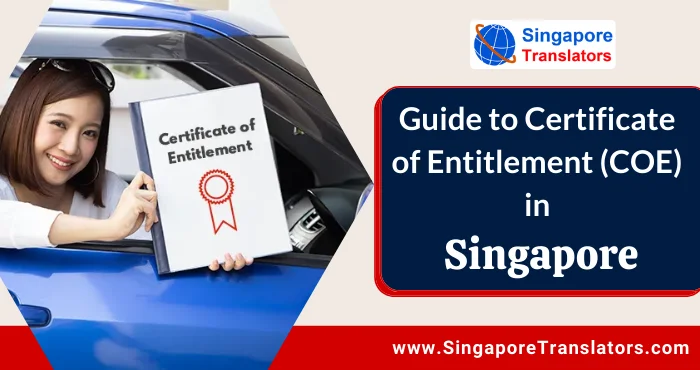
Acquiring a Certificate of Entitlement is one of the most important documents that go hand-in-hand along with owning a car in Singapore. The Certificate of Entitlement system, also known as COE in Singapore, works as a quota to grant successful car bidders to register, drive or own a vehicle in Singapore for up to ten years. This system is operating for the past 30 years, whose primary motive is to manage the traffic in Singapore.
No doubt, at times renewal process and bidding system of Certificate of Entitlement become complicated. But, don’t worry; in order to give you a complete understanding of the Certificate of Entitlement and how the system works, we have come up with a perfect guide on COE.
Table of Contents
hide
What Is Certificate of Entitlement (COE)?
Each vehicle in Singapore needs a Certificate of Entitlement. The certificate grants the driver to lawfully register, use, and own a vehicle of several different groups in Singapore. Although it comes with the validity of 10 years, in order to acquire the Certificate of Entitlement, the drivers will be required to be a part of and successfully win in the auction process.
The motive behind introducing the Certificate of Entitlement system is to control the rapid vehicle population growth in the 1990s. By creating a list of the vehicle allowed on the roads, traffic congestions have been significantly in control after the launch of the COE system. However, today’s COE system has turned into one of the essential parts of the Singapore traffic management strategies that have contributed a lot to the urban quality of life.
What is the purpose of COE?
Many people might be thinking about the purpose of introducing the Certificate of Entitlement (COE) system in Singapore. Well, this is because Singapore is known as the lion city, having the highest road densities across the world, reportedly 480.6 km per 100 sq. km in 2011. With the land constraint, it was essential for the Singapore government to manage the growth of vehicles on the road in Singapore. Hence, considering the rapid growth of vehicles, the Singapore government introduced a Certificate of Entitlement in the 1990s. As a result, the new development has helped Singapore a lot in easing the congested roads, managing a high volume of traffic, and regulating vehicle populations’ growth.
Get Fast & Accurate official notarization for ICA, MOM, MFA.
What Are The Different COE Categories?
The Certificate of Entitlement is categorized into five categories; in order to own and operate a vehicle in Singapore, the drivers need to bid for the matching Certificate of Entitlement categories given below:
- Category A: The cars of this category has an engine capacity of up to 1600 cc and maximum power output of 97 kW (130bhp)
- Category B: Cars of this category comes with the engine capacity same as category A (i.e., 1,600cc or maximum power output as above 97kW (130bhp)
- Category C: This category car consists of Goods carrying vehicles and buses
- Category D: Motorcycles
- Category E: This category is the “open category” COE, which can be considered for all the above categories.
All the above-given categories are the various type of categories due to which different types of vehicles and cars can be found on the Singapore roads. Suppose you purchase the car having a higher engine capacity, then in such a case, you will require to pay the higher price for the Certificate of Entitlement. This mainly applies to the additional vehicle emissions for higher engine cc cars.
However, for the open category, i.e. (Cat E), it grants the drivers to choose any kind of car as per their choice from the above categories. No doubt, for category E, there are fewer bidders to compete with you. This means you have you will get more freedom to choose the vehicle. However, for such a category, you will be required to pay the price – COE for Car E costs the most compared to others.
COE Terms You Need To Know
When buying a new vehicle in Singapore, you might listen to some of the acronyms and terms that you might not be aware of. That’s why in the below paragraph, we have outlined some of the terms that you must know during your car buying journey.
Vehicle Quota System (VQS)
The vehicle quota system is defined as the system that institutes a quota on the number of vehicles used in Singapore at a given time. This is to limit the supply of certificates of entitlement available.
However, any Certificate of Entitlement category you choose will be valid for ten years. You can renew your Certificate of Entitlement if you wish to continue using your vehicle, or you also have an option to deregister or scrap it.
Additional Registration Fee (ARF)
Additional registration fee is a type of Tax levied at the time of registration of the vehicle. This tax is calculated on the basis of the percentage of the open market value of your chosen vehicle. You have the option to pay the additional registration fee along with several other relevant taxes and fees.
Preferential Additional Registration Fee (PARF)
Any vehicle below the age of 10 is defined as the Preferential Additional Registration Fee (PARF). This type of car is only eligible for the Preferential Additional Registration Fee (PARF) rebate, i.e., scrap value that you will receive when deregistering the vehicle. The preferential additional registration fee is calculated based on the time left for the expiry of COE and ARF. As per the rule, the newer your car will be when deregistering it, the more PARF rebate you will receive.
Quota Premiums (QP)
Quota premium is defined as the premium that each successful bidder will require to pay for their Certificate of Entitlement dependent on the chosen category. The premium is calculated by adding $1 to the highest unsuccessful bid in the category. The premiums of each Certificate of Entitlement (COE) category may vary based on the demand.
Hire a Language translator for converting your legal & Other Documents.
Prevailing Quota Premium (PQP)
Prevailing Quota premium is the average Certificate of Entitlement (COE) prices in the previous three months. However, the premium price will keep on changing month to month, based on the preceding month’s prices. Therefore, those drivers intending to renew their Certificate of Entitlement will be required to pay the prevailing quota premium rather than following the complete COE bidding process again.
The Auctioning Process
So now, when you are aware that every Singapore driver will require to undergo the auction process to bid on the Certificate of Entitlement, how does this bidding process actually work? The bidding process is exciting, and it entirely fits with the daily schedule.
In order to thoroughly understand the Certificate of Entitlement, every Singaporean needs to understand the bidding process. Most of the Certificate of Entitlement bids start immediately on the first and third Monday of each month. The bidding period continues for three days, and it ends on Wednesday. If there is a public holiday on any bidding days, then the auction day will be extended. With the enhancement in internet technology, the bidders also have the option to check the results on the same day by visiting the auction website.
The bidding process is mainly used for two distinct categories, i.e., Category A and Category B. It also applies to category C, mainly for the buses and goods transportation vehicles, and category D is for the motorcycles, but these involve separate bidding systems. The bidding is mainly done in the name of the person willing to buy the vehicle. So that they can quickly check the results if a Certificate of Entitlement is allotted to them. Once the certificate is granted to the particular person, the vehicles get registered in their name and cannot be transferred to any third person.
Renewing COE
When the Certificate of Entitlement gets expired, the owner of the certificate will require to apply for the renewal if they wish to get the car registered under their name. If the owner does not apply for the renewal, the car will be deregistered and scrapped ultimately.
Several people intend to buy the new car upon the expiry of the Certificate of Entitlement. This is because for most people renewing the Certificate of Entitlement is an expensive option.
The owners are granted to renew their certificate prior to the expiry date of the document. However, it can also be extended for the next 30 days even after the expiry as long as the certificate owner applies for the renewal.
Moreover, the owners are not allowed to drive the car on the road in Singapore during the renewal process. The certificate owner should also be ready to pay the additional fee in case of late payment.
Some ways to renew your COE
Here are some ways on how to renew your COE:
Listed below are some of the ways through which you can renew the Certificate of Entitlement:
1. Renewing COE Online
The enhancement in technology over the years has made the renewal process of the Certificate of Entitlement easier than before. However, to renew your certificate online, you will require access to the online platform (like the One Motoring website).
The website as mentioned above is certified and operated by the Singapore land transportation authority. It engages in all the things related to vehicle information and reliable digital services.
You need to fill up all the required information. In addition, you must have a personal Internet banking account with sufficient funds in any of the below-given banks.
Citibank
DBS/POSB
Standard Chartered
OCBC
UOB
2. Renewing the COE via Snail Mail and through LTA’s Customer Service Centre
Renewing the Certificate of Entitlement through snail mail is one of the traditional but slow processes to complete the renewal process. However, the process is quite similar when proceeding to renew the certificate through LTAs customer service center.
You require to do is to simply download the Certificate of Entitlement renewal application form and fill up the necessary information and send it to the below-given address:
Land Transport Authority (LTA)
Customer Service Centre
10 Sin Ming Drive
Singapore 575701
If you wish to pay the renewal fees through the cheque, you will have to ensure that the cheque is drawn in favor of LAND TRANSPORTATION AUTHORITY” and cross “A/C Payee Only.
Besides this, you will need to include some basic details of your car and contact details at the backside of the cheque.
In the case of those individuals whose Certificate of Entitlement has already expired, the Land transportation authority will only consider the payments through Cashier’s order. Therefore, it is highly recommended to send the mail minimum of two weeks prior to the certificate’s expiry date. This is because the expiry date of your certificate is the same as the date on which the land transportation authority receives the application.
If your Certificate of Entitlement’s expiry date has already passed, be ready to pay the additional late fee. Moreover, suppose you fail to renew the vehicle Certificate of Entitlement even after the period of one month of expiry. In such a situation, you will require to deregister your vehicle and dispose of your vehicle promptly.
The payment of the certificate renewal fees is only accepted through cashier order, cash, and Diners Club or NETS card. Along with such, you should also remember the operating hours of the service Centre as stated below:
8:00 am to 4:30 pm on Mondays to Fridays
8:00 am to 12:00 pm on Saturdays
Renewing Your COE: 5 Years vs. 10 Years?
If you are looking to renew your Certificate of Entitlement, then you have two options to do so either you can renew for five years or ten years. The renewal period depends on several factors, like the category of your vehicle and its statutory lifespan.
Five-Year Renewal Period
If you intend to renew your Certificate of Entitlement for up to five years, you will be required to pay just half of the PQP needed. However, several conditions apply to each vehicle category. The vehicle category is basically categorized under four categories, i.e., A, B, C, and D.
Vehicles that come under the category of A, B, D can only apply for the renewal of the Certificate of Entitlement for up to 5 years once.
After that, you are no longer granted do so, and you require to deregister your vehicle promptly.
Additionally, category C vehicles are granted to renew their Certificate of Entitlement multiple times, even after their first renewal. However, the only thing that needs to be considered is that multiple renewals can only be for five years. Therefore, after your car reaches its constituted lifespan, you will no longer be granted to renew the Certificate of Entitlement, and you will have to deregister your vehicle immediately.
In contrast, if you choose to renew your Certificate of Entitlement for up to 10 years, then you will require to pay the entire PQP for your vehicle category. However, it’s not similar to the five-year renewal period, as vehicles falling under the category A, B, and D are not restricted to anything while renewing for ten years.
Five Years or 10 Years?
Opting to renew the Certificate of Entitlement for up to 5 or 10 years will be based entirely on you and how long you are willing to keep your car.
For example, suppose you are willing to keep your car for the next few years after the expiry of your certificate. Then it’s best to renew the certificate for up to 5 years only. It will not only benefit you by reducing the PQP by half, but it also is less commitment on your end.
In comparison, suppose your car is brand-new, and you are expecting to use the car for another ten years, then choosing to renewal the COE for the ten years will be the reliable option.
Should You Renew Your COE?
If your car is in excellent condition, you might consider renewing the Certificate of Entitlement rather than buying a new car.
Another benefit you will receive from renewing your Certificate of Entitlement is that you will only require paying the Prevailing Quota Premium. Also, remember that the prevailing quota premium is not fixed. However, from the past three months, we have noticed significant changes in the cost of the quota premium.
When deciding whether you require renewing your Certificate of Entitlement or not, always keeping in mind the potential rebate you might be giving up
If you decide not to renew your Certificate of Entitlement, you might eliminate your Preferential Additional Registration Fee (PARF) rebate. This is the scrap value that you will receive at the time of deregistering your vehicle.
When to Renew COE?
However, the land transportation Authority grants car owners to renew their Certificate of Entitlement within 30 days after the expiry date. It is suggested to apply for the certificate renewal as soon as possible to prevent additional late payments. Every car owner should aim to start planning for at least six months before your Certificate of Entitlement is due to expire.
Each vehicle category is accounted to a late renewal fee of different values.
Choose our Professional Translators for Translation Service
Now when you have a complete understanding of Certificate of Entitlement bidding and its renewal process. After reading the above article, you are very close to acquiring a certificate. Whether you are a first-time car buyer or seasoned car buyer, you can quickly acquire a certificate and continue driving in Singapore by following the above-given points thoroughly.
Along with the above guide on the Certificate of Entitlement, you can also acquire a driving license translation service at Singapore translator. At Singapore translator, i.e., a certified translation agency in Singapore, we have a highly experienced team of translators that offers legal translation services in Singapore. Our teams of translators are always ready to provide quality translation service to all document translation seekers.


